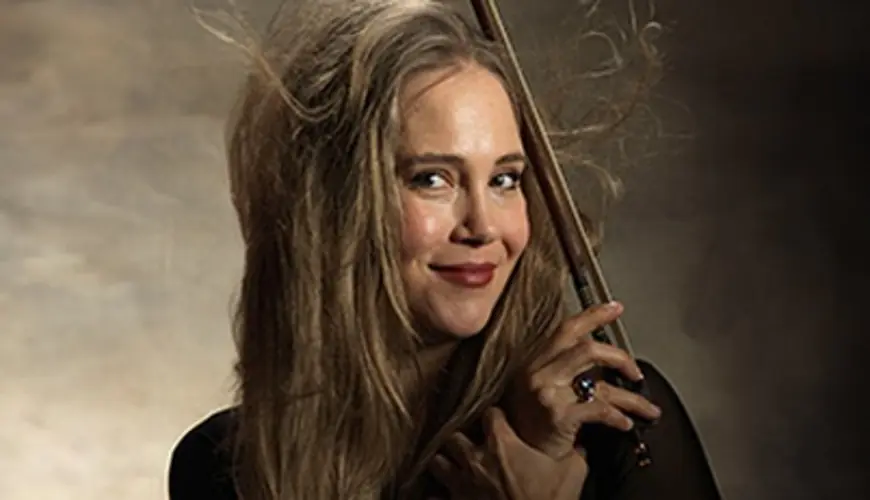Violinist Josefowicz, SD Symphony Thrill with Contemporary Classical and Dvorak’s ‘New World’
Lelia Josefowicz savors contemporary works that push the envelope technically. Her performance of "Concentric Paths" demonstrated virtuosic stamina, keening lyricism, and committed advocacy, and was rewarded with a standing ovation.



Roaming into Sunday afternoon’s San Diego Symphony concert in the (still) sensational-sounding Jacobs Music Center, I would have guessed that, if the concert satisfied, it would be because of violinist Leila Josefowicz and the composer she interpreted, Thomas Adès.
Josefowicz because she has become the go-to champion of new violin repertoire from leading contemporary composers (e.g., John Adams, Esa Pekka Salonen, and Adès). Adès not only because he makes any list of the most intriguing and celebrated of the younger generation of composers but because his 2005 violin concerto, Concentric Paths is one of his strongest works.
A one-time Bad Boy composer, Adès likes to describe music in scientific terms: “magnetic forces,” “instability,” “chemicals” and “nutrients.” But his abrasive Molotov-tossing has long been redeemed by his durable innovations, from his opera, The Tempest and his first piano concerto In Seven Days, to today’s Concentric Paths.
If not the afternoon’s highlight, Adès and Josefowicz’s collaboration did the opposite of disappoint. In her spoken introduction to Concentric Paths, Josefowicz whetted the audience’s curiosity with vivid images of “giant spacecraft,” “ferocious beasts,” and “magic tricks.” After flatly declaring it “one of the great masterworks of contemporary music,” Josefowicz began advocating where it counts, on her 2013 Zygmuntowicz violin.
Josefowicz savors contemporary works that push the envelope technically. Concentric Paths obliges by asking the soloist to retune her strings so she can extend herself into the fingerboard’s highest regions. Facial expressions communicating both the wrenching emotion of the piece and perhaps its difficulty, Josefowicz planted herself like a defending warrior, rocking, sawing, and fast-fingering through Adès brilliant score.
Its heart is a long feeling second movement with a central chaconne that reminded these ears of the passacaglia in another anguished landmark of British violin concerti, Benjamin Britten’s. Josefowicz’s virtuosic stamina, keening lyricism, and committed advocacy were rewarded with a standing ovation.
What could trump that? A Dudamel Fellow in 2018-19, Swiss-Australian conductor Elena Schwarz was once a masterclass pupil of Bernard Haitink and Neeme Järvi. As the San Diego Symphony’s guest conductor she projected both elegance and no-nonsense professionalism. Though a physical conductor, her gestures were always economical, sharply delineated, even stolid.
Her program opener, John Adams’ The Chairman Dances (Foxtrot for Orchestra), hinted at what was to come. Schwarz and the San Diego Symphony were very much up to the piece’s challenges: propulsive rhythms channeled through a large orchestra (including 18-pieces of percussion) asked to turn on a dime. It’s a funny, madcap piece featuring tempo shifts and a remarkable closing duet between piano and percussion. Schwarz kept all the balls in the air without ever losing Adams’ playfulness.
Antonin Dvorak’s Ninth Symphony has become U.S. classical programming’s great white whale, the supposedly “American” symphony trotted out when scheduling Barber, Ives or even Copland seems too risky (or 20th century). But leaving aside whether The New World has African-American and Native American themes, it’s a cracking good piece of work, and under Schwarz’s meticulous hand the San Diego Symphony made it sound brand-new. Her tight pacing (no dawdle or haste), skillful balancing of dynamic contrast within “the long line.” and attention to often-lost details and colors were all superb.
The highlight was the 12-minute Largo, which Schwarz and company gave a rapt, almost holy weight, streaked through with melancholy. Oboeist Andrea Overturf and Concertmaster Jeff Thayer outdid themselves. Collectively, the brass, woodwinds and percussion had a field day; the strings rose to every occasion. When the house rose to its feet, Schwarz modestly deflected the ovation back to the players with a big thumbs-up.
What's Your Reaction?









































































































